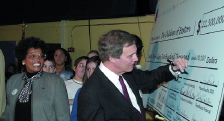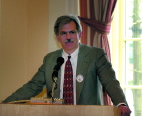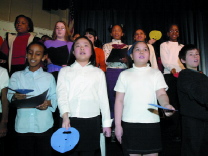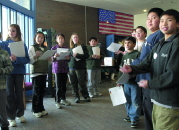The blue lights of police cruisers flashed outside Allston's Jackson/Mann elementary school on an early spring morning. "What's going on in there?" a local man pulled over to inquire. Told that a partnership of for-profit and nonprofit institutions had teamed with the city to raise millions for after-school programs, he let out a shout. "I've got kids in that school," he said enthusiastically.
The After-School for All partnership will provide $23 million from 12 institutional sponsors in the next five years for after-school programs in Boston. Harvard's $5-million contribution will go to the University's three host neighborhoods--Allston-Brighton, Mission Hill, and Fenway. At a March 14 press conference, the partnership shared data that showed the urgent need for after-school programming: only 20 percent of a child's waking hours are spent in school; 73 percent of Massachusetts children six to 17 years old live in families with all parents employed outside the home; juvenile crime is most frequent after school but before parents return from work; unsupervised children are at greater risk for truancy, pregnancy, poor grades, mental depression, and substance abuse. Students who attend high-quality after-school programs, according to a Wellesley College study, have higher grades, better peer relations and conflict-resolution skills, better emotional adjustment, and better conduct in school.
President Neil L. Rudenstine spoke briefly, recalling his own after-school program, to the audience's amusement: "Get home, take out the garbage...," followed by a litany of other household chores.
The new partnership helps Harvard further a constructive relationship with the City of Boston. Vice president for government, community, and public affairs Paul Grogan said in an interview that he believes the initiative will elevate after-school programming as a public-policy priority in both the city and the state. "It's also going to create a new relationship between the University's considerable faculty expertise--particularly that at the School of Education (GSE) in after-school programming and at-risk children--and community-based after-school programs throughout Boston, and particularly in our target neighborhoods," Grogan said. Associate professor of education Gil Noam, who directs the GSE's Program in After-school Education and Research, will work on curriculum development with local programs to create an academic connection to the school day, and with other Harvard groups--including Phillips Brooks House and the interfaculty Harvard Children's Initiative (see "Harvard Portrait: Judith Palfrey," March-April, page 57)--on professional development and retention and training of teachers, mentors, and tutors. Added Grogan, "It deploys the resources of the University in a very powerful way."
The partnership is Harvard's second major investment in Boston--the first was the 20/20/2000 housing program (see "Harvard on Housing," page 68, January-February 2000). "I think it signifies a real change in the University's posture toward communities, a decision to get systematically, deeply involved," Grogan noted. "I think it is going to continue." (Grogan himself will leave Harvard to become president of the Boston Foundation on July 1).
Harvard's relationship with Boston, tenuous after the disclosure of third-party land purchases in Allston four years ago, seems now to be on track. But town-gown relations in Cambridge are not so smooth, Grogan acknowledged.
"We will be looking also at opportunities to, perhaps, do something similar in Cambridge," Grogan said. But beyond the growth issues, "there is a form of government [in Cambridge] that makes it difficult to achieve consensus and reconcile differing interests." The city has a "weak-mayor" form of government with nine city councillors and a city manager who are often competitors. Boston has a "strong-mayor" form of government as well as a coordinated central-planning agency. "Neighborhood concerns are just as important in Boston," says Grogan, "but there is a political office that is designed to operate at a pretty high level to reconcile differing claims and bring disputes to a resting place. That just doesn't happen in Cambridge--the government can't perform that function effectively. Politically, that means that the power of neighborhood groups is huge." That makes development very difficult and contentious.
Announcement of a Harvard-funded $100,000 summer program for at-risk high-schoolers in Cambridge was postponed by an angry Mayor Anthony Galluccio, who was blindsided by the size of Harvard's financial commitment to Boston. "We care about Cambridge," Grogan emphasized. The summer program is "not as big in dollar terms as what we announced in Boston, but I think it is the beginning of a series of things that you will see happen in Cambridge as well."
 |  |
| At a press conference held at the Jackson/Mann elementary school in Allston, President Neil L. Rudenstine (above left) joined for-profit and nonprofit partners in signing a $23-million check to support Boston after-school programs. Students at the school sang for joy (below). Vice president for government, community, and public affairs Paul Grogan (above right) spoke at a lunch afterward, just a few miles down the road at the Business School's Spangler Center. | |
 |  |
| Kris Snibbe/Harvard News Office | |





